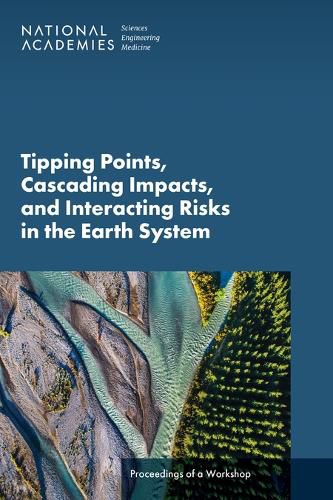Readings Newsletter
Become a Readings Member to make your shopping experience even easier.
Sign in or sign up for free!
You’re not far away from qualifying for FREE standard shipping within Australia
You’ve qualified for FREE standard shipping within Australia
The cart is loading…






Earth is a complex system, with myriad interactions and feedbacks among the atmosphere, hydrosphere, geosphere, cryosphere, and biosphere, as well as the people, institutions, and technologies that respond to and influence these dynamics. A systems-based approach to scientific research can yield understanding across all aspects of Earth's interconnected processes. Earth systems studies rest on careful analyses of physical, chemical, biological, and behavioral processes and their interactions and feedbacks; these studies are supported by observational platforms, laboratory and modeling facilities, a skilled scientific workforce, and the cyberinfrastructure that connects them to enable new breakthroughs.
This workshop was organized to explore the approaches to Earth systems science through the lens of a critical topic - tipping points - and to cultivate cross-disciplinary collaborations and prime new research communities to discuss examples of research needs in a broader context of Earth systems science. This publication summarizes the presentation and discussion of the workshop.
Table of Contents
Front Matter 1 Introduction 2 Historical Analysis of Past Biogeophysical and Social Tipping Points 3 Regional Perspectives on Climate Tipping Points and Cascading Risk 4 Examples of Interdisciplinary Research Priorities and Opportunities 5 Workshop Synthesis, Themes, and Closing Thoughts References Appendix A: Workshop Agenda Appendix B: Statement of Task Appendix C: Planning Committee Biographies
$9.00 standard shipping within Australia
FREE standard shipping within Australia for orders over $100.00
Express & International shipping calculated at checkout
Earth is a complex system, with myriad interactions and feedbacks among the atmosphere, hydrosphere, geosphere, cryosphere, and biosphere, as well as the people, institutions, and technologies that respond to and influence these dynamics. A systems-based approach to scientific research can yield understanding across all aspects of Earth's interconnected processes. Earth systems studies rest on careful analyses of physical, chemical, biological, and behavioral processes and their interactions and feedbacks; these studies are supported by observational platforms, laboratory and modeling facilities, a skilled scientific workforce, and the cyberinfrastructure that connects them to enable new breakthroughs.
This workshop was organized to explore the approaches to Earth systems science through the lens of a critical topic - tipping points - and to cultivate cross-disciplinary collaborations and prime new research communities to discuss examples of research needs in a broader context of Earth systems science. This publication summarizes the presentation and discussion of the workshop.
Table of Contents
Front Matter 1 Introduction 2 Historical Analysis of Past Biogeophysical and Social Tipping Points 3 Regional Perspectives on Climate Tipping Points and Cascading Risk 4 Examples of Interdisciplinary Research Priorities and Opportunities 5 Workshop Synthesis, Themes, and Closing Thoughts References Appendix A: Workshop Agenda Appendix B: Statement of Task Appendix C: Planning Committee Biographies